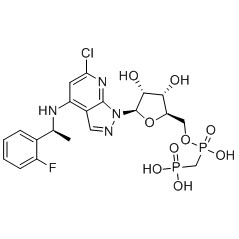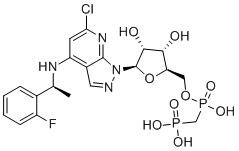
Description
Introduction
AB680, also known as 3-(3-(4-chlorobenzyl)-1-isopropyl-1H-pyrazol-5-yl)-N-(pyridin-4-yl)-5,6-dihydrobenzo[b]carbazole-7-carboxamide, is a chemical compound with the CAS number 2105904-82-1. It is a novel and highly potent inhibitor of the mitogen-activated protein kinase (MAPK)-interacting kinase 1 (MNK1). This makes it a promising drug candidate for the treatment of cancer and other diseases that involve dysregulated MNK1 signaling. In this product introduction, we will discuss the various aspects of AB680 that make it an attractive option for merchants who are looking to purchase high-quality chemical compounds.
Chemical Properties
AB680 has a molecular formula of C34H30ClN5O and a molecular weight of 569.099 g/mol. It is a yellow powder that is soluble in DMSO (dimethyl sulfoxide) and ethanol. The melting point of AB680 is approximately 263-265°C. The purity of AB680 is 99% or higher, which makes it a highly reliable compound for research and development purposes.
Applications
AB680 has shown promising results in preclinical studies as a potential therapy for a variety of diseases, including various types of cancer. Specifically, it has been shown to inhibit the growth of human triple-negative breast cancer cells, which are notoriously difficult to treat. This makes it a highly attractive drug candidate for the treatment of breast cancer, which remains one of the most common and deadly cancers among women worldwide.
AB680 has also shown efficacy in other types of cancer, including glioblastoma, melanoma, and colorectal cancer. It achieves this by inhibiting the MNK1 signaling pathway, which plays a critical role in cell proliferation, survival, and migration, among other cellular processes. By blocking this pathway, AB680 effectively slows down or stops the growth of cancer cells, which can potentially lead to the elimination of tumors.
Apart from cancer, AB680 has also shown potential in treating Alzheimers disease. It has been reported that AB680 is able to improve cognitive impairment in transgenic mice with Alzheimers disease by inhibiting MNK1 signaling and regulating the levels of amyloid β-peptide, which are critical factors in the development of the disease.
Pricing and Availability
As a Chinese manufacturer of AB680, we strive to provide high-quality compounds at competitive prices. Our products are available in bulk quantities for research and development purposes. We offer convenient ordering and shipping options to ensure that our customers receive their orders quickly and efficiently.
Conclusion
In conclusion, AB680 is a highly promising drug candidate for the treatment of cancer, Alzheimers disease and other diseases that involve dysregulated MNK1 signalling. Its high potency, excellent purity, and promising preclinical results make it an attractive option for researchers and drug developers worldwide. As a manufacturer of this compound, we are committed to providing high-quality products at competitive prices to enable further research and development in this important area of medicine.
Chemical Structure : AB680
CAS No.: 2105904-82-1

AB680 (AB-680;Quemliclustat)
Catalog No.: URK-V1553 Only Used For Lab.
AB680 (Quemliclustat) is a highly potent, selective, reversible inhibitor of CD73 with Ki/IC50 of 4.9/70 pM (hCD73).
Biological Activity
AB680 (Quemliclustat) is a highly potent, selective, reversible inhibitor of CD73 with Ki/IC50 of 4.9/70 pM (hCD73).
AB680 displays > 10,000-fold selectivity against related ecto-nucleotidases (CD39, NTPDases 2/3/8) and a large panel of unrelated enzymes, receptors, and ion channels.
AB680 completely inhibits CD73 enzymatic activity on CD8+ T cell, robustly restores proliferation of human CD4+ T-cells and reverses AMPmediated inhibition of IFN-γ and IL-2 production, limits the inhibitory effect of AMP on CD4+ T cell proliferation with IC50 of 4.5 nM.
AB680 also potently restored CD25 expression on human CD8+ T cells.
Physicochemical Properties
|
M.Wt |
580.83 |
|
|
Formula |
C20H24ClFN4O9P2 |
|
|
CAS No. |
2105904-82-1 |
|
|
Storage |
Solide Powder -20 °C 3years; 4°C 2years |
In Solvent -80°C 6 Months -20°C 1 Months |
|
Solubility |
DMSO: 200 mg/mL |
|
|
Chemical Name |
(((((2R,3S,4R,5R)-5-(6-chloro-4-(((S)-1-(2-fluorophenyl)ethyl)amino)-1H-pyrazolo[3,4-b]pyridin-1-yl)-3,4-dihydroxytetrahydrofuran-2-yl)methoxy)(hydroxy)phosphoryl)methyl)phosphonic acid |
|
References
Note: All products of Ureiko are only used for scientific research or drug certificate declaration, and we do not provide products and services for any personal use!
Why choose us?
- Our commitment to innovation and creativity is reflected in the quality of our Others products.
- We use our core competitiveness to create more customers and markets and promote the company's profitability, so as to make the company develop continuously and become a century old brand.
- Our quality assurance program ensures that each product meets the highest standards.
- Advanced equipment, professional technology and perfect management ensure that our AB680 CAS No.:2105904-82-1 are always at the forefront in the same industry.
- Our factory produces top-notch Others products with exceptional quality.
- Our company always adhere to the 'customer first, quality first' service tenet, and constantly improve professional services to meet the various needs of customers.
- Our commitment to sustainability and environmental responsibility guides our manufacturing processes.
- We build the image outside, strengthen the quality inside, comprehensively improve the comprehensive competitiveness of the enterprise and realize the benign leaping development of our company.
- Our team of designers and engineers can create custom Others products to meet specific requirements.
- Nowadays, our business cover all around the world, with customers from some well-known enterprises and committed to explore new markets actively.
Hot Tags: ab680 cas no.:2105904-82-1, China ab680 cas no.:2105904-82-1
Send Inquiry
You Might Also Like







